Inventing Baby foods
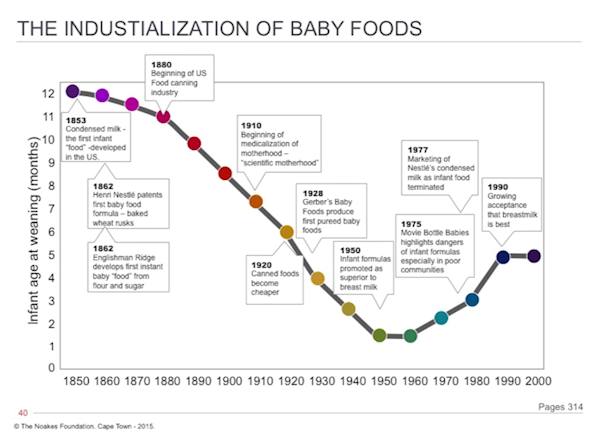
The development of the Baby Foods Market
1853 - Condensed milk was the first baby food in the USA.
1862 - Hodge in UK, offered flour and sugar as baby food.
1862 - Henri Nestlé develops a breakthrough infant food - rusks
1867 - Henri Nestlé develops, ‘farine lactée’. (Milk, flour and sugar)
1880 - The canning industry began
1910 - "Scientific Motherhood" was first promoted.
1920 - Canned foods were cheap enough for domestic use.
1928 - Gerber's "Purified" baby foods were marketed.
1950 - Infant formula was promoted as the modern, scientific and superior way to feed your baby.
1975 - The dangers of infant formulas were highlighted.
1977 - The marketing of Nestlé Condensed Milk as a baby food was terminated.
1990 - Growing acceptance that breast milk was the best baby food.
Amy Bentley in "Inventing Baby Foods" writes about the development of canned baby foods by Gerber Foods in the 1930's. By 1950, some companies were recommending that weaning should begin at one month. We now know that this advice is completely wrong, and current recommendations are to begin weaning at six months, but only onto complementary foods. Breast feeding should continue for as long as the child wants the milk.
In "The Englishman's Food" by T.C. Drummond and A Wilbraham, they write that infant foods contained mostly flour, starch, malted flour and similar cheap materials. On this diet children appear to flourish, especially if mothers milk or full cream milk is available. But the children by the age of two or three became overweight and flabby. We now know that this diet was deficient in proteins, vitamins and minerals. Many children developed either rickets or undiagnosed rickets, and later, poor quality adult teeth.

Amy Bentley explains that commercial companies presented doctors and other "baby experts" to build the assumption that these were "modern" prepared foods that were superior for baby's health. They were also efficient and time saving for mothers. An advertisement from the 1930's presents baby food as pure, wholesome, convenient, modern, and scientific. Using commercial baby foods made mothers feel confident and modern. It also made it possible for many of them to take on extra employment.

Bentley also explains that when we feed children low density foods, like breads, cereals and starches, we "fill them up" but we didn't feed them with quality nutriments. As a result the demand for breast milk which is nutritious may be reduced, a double loss.
One of the innovations of the 1940's was the idea of introducing one food at a time, beginning with white rice. Some there was a special order for introducing new foods, white rice, apple sauce, mashed banana, pureed vegetables, and lastly meats. By the end of WWII, in the USA, white rice was firmly established as the ideal first food for weaning babies.
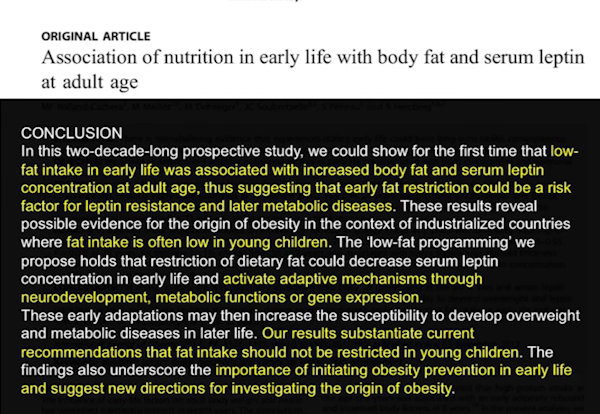
This reinforces a theme that I've seen often. Industry sets the agenda, and tells us what's good for us. We now know that this diet was entirely inadequate, especially if suckling was reduced.
"Baby Foods" to Avoid
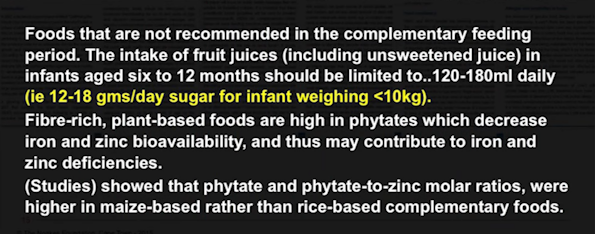
Fruit juices, and flour based foods like rusks, or cereals and bread, contain "energy" but very little nutriment. Porridge is filling, but it's not a quality food. Adding butter, cream, or chopped bacon to it would help increase the nutriment density.
Added sugar should be eliminated from the diet of children. Porridge or Weet-bix with sugar is a double bad.
Grain Based Foods are Insufficient
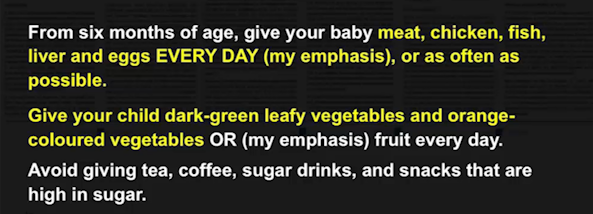
Because of poverty most children in South Africa are weaned onto soft maize meal porridge, a bulky food but with low nutriment density. It's insufficient in protein and fats, vitamin A, iron, zinc and calcium. In South Africa less that 20% of infants are given meat based foods, and only 20% get dairy products regularly.
Our Fat Human Babies Must be Fed a Quality Diet
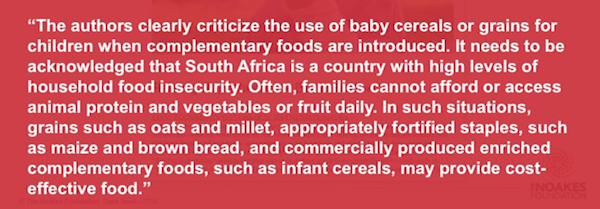
The science is very clear - to build a strong nation we have to feed our children well. The South African Dietary Guidelines for Weaning are a fabulous resource, but they admit that many families cannot afford the best diet, so the guidelines cannot be followed. The solution is to for government to make better quality food available to families with young children. We shouldn't accept poor diet as normal in our society.
The South African Dietary Guidelines for Weaning recommend that children are fed chicken, fish, meat, dairy foods and eggs every day, so children will grow taller. They will also develop larger brains. Unfortunately, chicken, fish, meat, dairy foods and eggs are expensive. In South Africa their daily inclusion in the diet of infants is a challenge.
